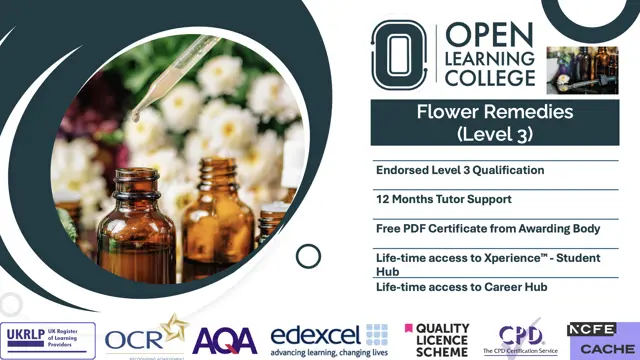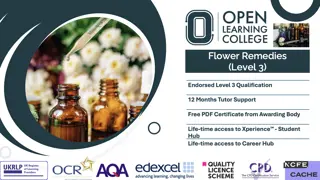
Flower Remedies (Level 3)
Distance Learning Course, featuring tutor support and AI assistance, available online or as a study pack option.
Open Learning College
Summary
- Tutor is available to students
- TOTUM card included in price What's this?
Add to basket or enquire
Overview
Embark on a transformative learning journey with the UK’s most innovative home study provider, offering courses designed to unlock your true potential and facilitate the career change you desire. Access our distance learning courses directly from anywhere, anytime, and acquire industry-recognised Professional Qualifications essential for advancing in your career.
Specifically, explore the flexible and convenient Flower Remedies (Level 3) course, an ideal way to gain a diploma qualification. Whether you aim for further education, improved job prospects, or expanded knowledge, this comprehensive course allows you to prepare thoroughly for exams or careers through home study. Plus, it’s structured to be accessible and beneficial even if you have no prior knowledge in Flower Remedies.
Flower remedies are specially prepared flower essences, containing the healing energy of plants. They are prescribed according to a patient’s emotional disposition, as ascertained by the therapist, doctor, or individuals themselves.
Flower remedies are more homeopathic than herbal in the way they work, addressing energy levels rather than chemical balances. The remedies work on the principle that they encapsulate the flowers’ healing energy, and are said to deal with and overcome negative emotions, and so relieve blockages in the flow of human energy that can cause illness or imbalance.
This Level 3 Diploma in Flower Remedies will be ideal for those looking to study Flower Remedies to therapist level. You will discover the fundamentals of flower remedy therapy, from assessment of area of need, to interviewing and prescribing appropriate remedies. The course is suitable for students with little or no basic knowledge of flower remedies. It not only covers theoretical knowledge and understanding but also practitioner approaches and remedy prescribing, providing a thorough holistic overview of the therapy.
Achievement
Description
Module 1: What are Flower Remedies?
This module explores the historical origins of Flower Remedies and draws comparisons between alternative and complementary medicine with conventional medicine, placing the practice within the correct context. Within the module, there is an opportunity to study the nature of flower essences and particularly the work of Hahnemann, the concept of Vital Force – and its physiological function.
Module 2: Dr. Edward Bach’s Contribution
This module provides an opportunity to study the biography of Dr. Edward Bach and through discussion of his works identify the timeline for Flower Remedy practice as it stands today. There is discussion relating to Dr. Bach and his interest in astrology, personality types, responses, habits and life lessons – all of which contribute to the application of modern Flower Remedy practice. He asserted that a flower essence possesses the vibrational energy of the flower it is derived from. Nosodes are also discussed and there is incorporated content on oral remedies refined from bacterial vaccines; the differences between flower remedies and homeopathy and the relationship of flowers to herbs. This module also explains the misunderstandings and myths associated with Flower Remedies.
Module 3: The Healers and the Helpers
This module explores how remedies are clustered, which ‘moods’ they apply to and how practitioners consider their administration. Sections include: the twelve healers, the twelve states, the seven helpers, fear, uncertainty, insufficient interest in present circumstances, loneliness, oversensitivity to influences and ideas, despondency and despair and over concern for the welfare of others.
Module 4: Types and Groups
This module progresses from the previous one and focuses on the following issues of interest: the thirteen remedies – corresponding with an individual’s state of mind, remedy typology – relating to an individual’s characteristics, and five flower remedies. These are rescue remedies and apply to fear and worry, depression and hope, confidence, particular occurrences, relationships and action. The rationale of knowledge and understanding of flower remedies related to diagnosis and in-depth prescribing is explored further.
Module 5: The 38 Essences
This module provides students with a comprehensive list in alphabetical order of the 38 essences used in flower remedy applications, their uses and relationships to symptoms. This provides practitioners with a comprehensive resource guide.
Module 6: Systems, Dosage and Strength
In this module, the background of flower remedy systems is explored and provides a base for discussion of common usage, relating to demography and the general knowledge that practitioners require to support practical application of this discipline. There is also exploration of the techniques and implements used in the practical creation of flower remedies, including methods of essence production, the Mother Tincture, potency, storage and how doses are established.
Module 7: Repertory
The repertory is explained as an index of symptoms taken and corresponding flower remedies, dosages, indications etc. for moods. It is provided for the student, and arranged in alphabetical order, providing the practitioner with an invaluable resource base for consultation.
Module 8: Interviewing and Questionnaires
The importance of assessing individual client needs accurately is a fundamental part of any practice, as is recording remedies given, doses and effects. This module provides the student with information on how to obtain an accurate client history and understand the correlating ‘moods’ of an individual. This is normally done through a format of questions, providing a checklist of symptoms from which practitioners can consider the corresponding remedies. Information includes: catalyst matching, marking questions, methods of interviewing clients, practitioner responsibilities, case studies, listening skills, example questionnaires, self-prescribing, and the correct use of the repertory.
Module 9: Special Circumstances
There are occasionally circumstances and groups of individuals who fall outside the more usual repertory and examples. This module examines the requirements and practical applications for using flower remedies with babies, children and pets. Issues covered include: plot essences, personal control, additional remedies, practitioner tools and strategies for working with these individuals.
Module 10: Practice, Care and Storage
The final module addresses important features of practice. These include the administration of remedies – how are they given, any contra-indications and issues such as the correct hygienic standards etc. There is a section dedicated to guidance about perfect storage of the remedies. Additional facts, frequently asked questions and answers and form templates are provided to help practitioners begin to collate administrative processes ready for receiving clients.
Who is this course for?
Target Audience
- The Flower Remedies course caters to individuals keen on exploring alternative healing methods and natural remedies.
- It's suitable for holistic health enthusiasts, herbalists, and individuals intrigued by the therapeutic benefits of flowers and plants.
- This course is ideal for those aspiring to delve into floral therapy, seeking a deeper understanding of how flower essences can contribute to emotional well-being and holistic healing.
- Additionally, it appeals to complementary medicine practitioners and individuals passionate about incorporating natural remedies into their wellness practices.
Requirements
Course Requirements
- The good news is that no prior learning knowledge or experience is essential to take this course. This course is openly available to anyone wishing to learn more about Flower Remedies (Level 3) and would like to take part in a highly rewarding distance learning study course.
- We believe that everyone should have the opportunity to expand their knowledge and study further, so we try to keep our entry requirements to a minimum.
- You have the freedom to start the course at any time and continue your studies at your own pace for a period of up to 12 months from initial registration with full tutor support.
Questions and answers
Reviews
Currently there are no reviews for this course. Be the first to leave a review.
Legal information
This course is advertised on reed.co.uk by the Course Provider, whose terms and conditions apply. Purchases are made directly from the Course Provider, and as such, content and materials are supplied by the Course Provider directly. Reed is acting as agent and not reseller in relation to this course. Reed's only responsibility is to facilitate your payment for the course. It is your responsibility to review and agree to the Course Provider's terms and conditions and satisfy yourself as to the suitability of the course you intend to purchase. Reed will not have any responsibility for the content of the course and/or associated materials.



